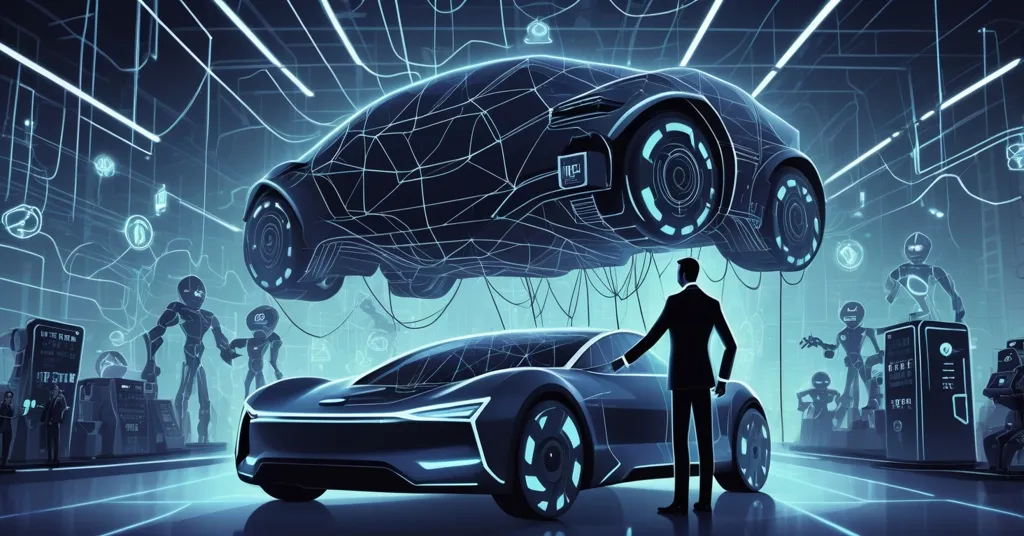Elon Musk’s $1 Trillion Tesla Pay Plan Faces Fierce Backlash and Crypto-Like Risks

Elon Musk’s $1 Trillion Tesla Pay Plan Ignites Governance Firestorm with Crypto Echoes
Tesla Inc. is once again in the crosshairs of controversy as proxy adviser Institutional Shareholder Services (ISS) doubles down on its opposition to a mind-boggling $1 trillion compensation package for CEO Elon Musk. With a critical shareholder vote set for November 6, the debate rages over whether this astronomical payout is a genius move to secure Tesla’s future or a reckless gamble that mirrors the pitfalls of centralized control we’ve seen in crypto disasters.
- ISS Pushback: ISS urges shareholders to reject Musk’s $1 trillion pay plan, slamming its size and lack of guarantees for his focus on Tesla.
- Tesla’s Defense: The company claims the package is crucial to keep Musk for a decade, tying it to goals like an $8.5 trillion market cap.
- Shareholder Stakes: The November 6 vote comes amid Tesla’s declining sales and echoes of crypto’s centralization risks.
The Trillion-Dollar Gamble
Let’s put this in perspective: $1 trillion is roughly on par with Bitcoin’s total market capitalization at its peak moments. That’s the scale of the compensation Tesla is dangling before Elon Musk, with a temporary $30 billion payment already handed out in August as a down payment until the full plan gets the green light. This isn’t just big—it’s unprecedented in corporate history. Tesla’s board, spearheaded by chair Robyn Denholm, insists this mega-deal is the only way to ensure Musk sticks around for another ten years. They’ve linked the payout to some seriously ambitious targets: pump Tesla’s market value to $8.5 trillion (from its current ~$800 billion), or dominate futuristic fields like robotics and self-driving robotaxis. If Musk pulls it off, he could also boost his voting power to a 25% ownership stake, giving him even more control over Tesla’s direction.
But here’s the catch: these are moonshot goals, not guarantees. For those new to corporate lingo, voting control means Musk would have a bigger say in board decisions, potentially shaping Tesla’s strategy single-handedly. The board’s bet is that Musk’s vision is worth every penny, even if it sounds like a sci-fi script. Yet, with Tesla’s growth narrative faltering, is this a visionary masterstroke or a trillion-dollar pipe dream?
ISS Strikes Back
Institutional Shareholder Services, for the uninitiated, is a proxy adviser—a firm that guides big investors like pension funds on how to vote on corporate matters. For the second year in a row, ISS is telling Tesla shareholders to slam the brakes on Musk’s pay plan. Their beef? The sheer magnitude of the package is obscene, the structure is flawed, and there’s zero assurance Musk won’t be distracted by his other toys. They’ve aired “unmitigated concerns” about the deal, pointing out that nothing legally binds Musk to prioritize Tesla over his sprawling empire, as highlighted in recent critiques of Tesla’s massive CEO compensation plan.
ISS has flagged “unmitigated concerns” with the pay plan’s magnitude and design, especially the absence of explicit requirements for Musk to focus on Tesla.
Tesla isn’t having it. In a sharp retort on X, the company blasted ISS for missing the mark on investing and governance principles, essentially calling them sideline critics with no skin in the game. Robyn Denholm has been hitting the campaign trail hard, meeting investors and doubling down on Musk’s indispensability. As she told The Wall Street Journal:
“No one but Musk can run the company.”
It’s a hell of a statement, but it begs the question: is Tesla a one-man show, or should a publicly traded giant have more checks and balances?
Musk’s Divided Empire
Elon Musk isn’t just Tesla’s CEO—he’s a one-man conglomerate. He’s juggling five major ventures: Tesla, SpaceX, Neuralink, xAI, and The Boring Company. That’s a lot of hats for one head, and shareholders are getting twitchy. Is Musk fully plugged into Tesla’s electric vehicle (EV) mission, or is he mentally halfway to Mars with SpaceX or tinkering with AI at xAI? ISS isn’t the only one worried about his split focus. Investors, already rattled by Tesla’s slipping sales, aren’t thrilled at the idea of funding a CEO who might be mining attention elsewhere.
Musk hasn’t helped ease those fears. He’s hinted that if he doesn’t get a bigger stake in Tesla, he might take certain innovations—like next-gen products or robotaxi tech—to other companies in his portfolio. That’s a ballsy ultimatum: pay me, or I’ll build my future elsewhere. ISS also threw shade at a weird side proposal for Tesla to invest in xAI, Musk’s AI outfit, calling it a bizarre overreach. Since when does a car company play venture capitalist for its CEO’s pet projects? For shareholders, it’s another red flag that Musk’s loyalties might be as scattered as a bad NFT drop.
Tesla’s Struggles and Speculative Bets
Let’s talk hard numbers. Tesla’s sales have been sliding, with third-quarter 2023 deliveries dropping 6.3% year-over-year, per recent reports, as competitors like China’s BYD close the gap in the EV market. The growth story that once made Tesla the darling of Wall Street—endless expansion, sky-high valuations—is looking shakier by the day. Against this backdrop, justifying a $1 trillion payday feels like selling a memecoin on promises alone. The robotics and robotaxi ventures tied to Musk’s payout sound cutting-edge, but they’re untested. No significant revenue, no proven market—just hype. Sound familiar? It’s reminiscent of crypto’s 2021 NFT craze, where big promises often led to bigger busts.
Tesla’s history of disruption can’t be ignored, though. Musk turned a niche EV startup into a market titan, much like Bitcoin reshaped finance from the fringes. But past wins don’t guarantee future jackpots, especially in a maturing EV landscape where competition is fierce and margins are thinning. Banking a trillion bucks on speculative tech, while Tesla’s core business stumbles, feels like a gamble even for a company that’s defied odds before.
Crypto Parallels: Centralization Risks
For those of us in the Bitcoin and blockchain space, Tesla’s saga hits close to home. Musk’s outsized role at Tesla mirrors the dangers of over-centralized control we’ve seen in crypto projects gone wrong. Think Terra/Luna under Do Kwon—a brilliant mind at the helm, until the whole thing imploded under unchecked power. Tesla’s reliance on one man, no matter how visionary, risks creating a single point of failure, the exact flaw Bitcoin maximalists rail against in traditional systems. Decentralization isn’t just a buzzword; it’s a safeguard. Could Tesla learn from blockchain’s ethos of spreading power via mechanisms like DAOs (Decentralized Autonomous Organizations), where decisions aren’t dictated by one overlord but by a community?
Musk might be Tesla’s Satoshi Nakamoto, the enigmatic force that birthed a revolution, but even Bitcoin evolved beyond one figurehead. Tesla’s governance woes also echo crypto’s darker chapters—questionable leadership moves, lack of transparency, and investor fatigue. The Delaware court ruling in 2024, which axed Musk’s 2018 pay deal over his undue sway on the board, smells like the kind of backroom dealing that’d get a crypto project labeled a scam on X. Tesla’s pivot to Texas as a corporate home might dodge legal heat, but it doesn’t fix the perception of governance rot. For a company claiming to disrupt the status quo, leaning on old-school power plays is a bad look.
What’s Next for Tesla?
The November 6 shareholder vote isn’t just about Musk’s paycheck. It’s a referendum on whether one person’s vision can outweigh collective accountability in a publicly traded behemoth. Proxy advisers like ISS hold sway over institutional investors—think big funds that follow their lead—while retail shareholders, often Musk loyalists much like crypto hodlers, might still back their maverick. Legal battles linger, with an appeal on the 2018 pay ruling pending in Delaware’s Supreme Court as of mid-October. But the bigger picture is what this means for tech giants broadly. If Musk wins, does it cement the cult of personality over sound governance? If he loses, does Tesla risk a “hard fork” of leadership, losing its edge?
For our community, this is a stark reminder of why decentralization matters—whether in finance or corporate power. Musk might be a genius, but even geniuses can overreach. Is he Tesla’s unstoppable engine, or its Achilles’ heel? That’s the trillion-dollar riddle shareholders must solve.
Key Questions and Takeaways
- Why is ISS opposing Elon Musk’s $1 trillion Tesla pay plan?
ISS criticizes the package’s insane size, poor structure, and lack of rules ensuring Musk prioritizes Tesla over side ventures like SpaceX or xAI. - How does Tesla defend this massive compensation?
Tesla argues it’s essential to retain Musk for a decade, linking the payout to bold targets like an $8.5 trillion market cap and robotics breakthroughs. - What risks does Musk’s split focus across multiple companies pose to Tesla?
Juggling five ventures, Musk could neglect Tesla, especially if he diverts innovations elsewhere as threatened, stalling the company’s progress amid declining sales. - How does Tesla’s governance issue relate to crypto’s centralization problems?
Tesla’s heavy reliance on Musk parallels failed crypto projects like Terra, highlighting the dangers of a single point of failure over decentralized decision-making. - Are Tesla’s futuristic goals like robotaxis enough to justify this payout?
While robotics could transform Tesla, current sales drops and unproven tech make the trillion-dollar bet look more like hype than a safe investment. - What can Tesla learn from blockchain’s decentralized models?
Adopting community-driven governance, akin to DAOs in crypto, could balance power at Tesla, reducing reliance on one leader and boosting investor trust.



